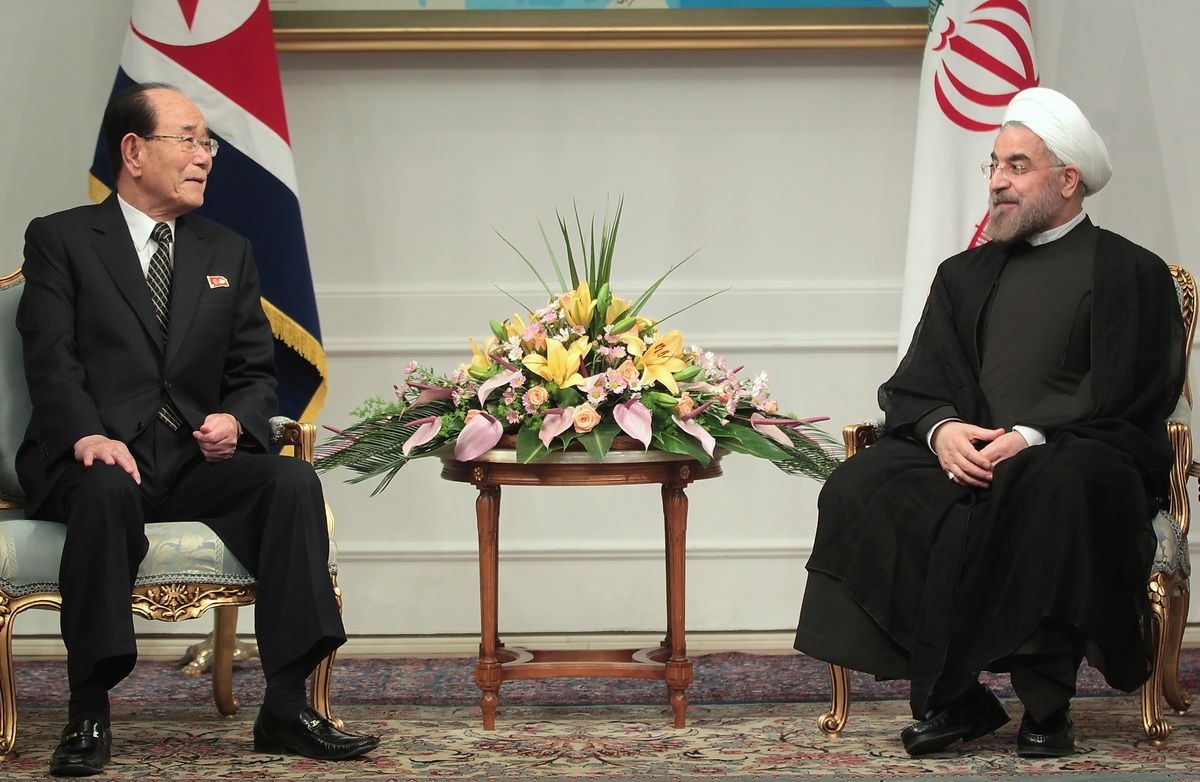Iran has been cozying up to its ally North Korea in the wake of new sanctions slapped on both countries last week by the United States, with North Korea’s second-highest ranking official paying a 10-day visit to Tehran.
President Hassan Rouhani called for international disagreements with North Korea to be solved amicably through dialogue, in a meeting with Kim Yong-nam, the president of the Presidium of North Korea's Supreme People's Assembly, or unicameral legislature, on Sunday in Tehran.
“We believe that the only way to settle the disputes in the Korean Peninsula is negotiation and dialogue. We hope to be witness of peace and stability in Asian continent, particularly in East Asia,” Rouhani said.
The presidium is the highest legislative body in North Korea and wields immense. Consisting of the president and his cabinet, it is considered the highest organ of state power.
According to North Korean media reports Kim Yong-nam, considered number two only to North Korea’s leader Kim Jong-un, arrived in Iran for 10-day trip on August 1, to attend President Rouhani’s inauguration for a second term on August 3, and oversee the opening of a new embassy in Tehran a day earlier. Yong-nam was accompanied by a Deputy Foreign Minister, and was the first guest to arrive in Tehran for the presidential inauguration ceremony, according to the official website of Iran’s president.
According to North Korea's state-run KCNA news agency, the newly built embassy in Tehran was "built to boost exchanges, contacts and cooperation between the two countries for world peace and security and international justice.”
Yong-nam’s visit to Tehran came a day after US President Donald Trump signed a legislative bill passed by both houses of the US Congress with an overwhelming majority to impose new sanctions on Iran, North Korea and Russia. The sanctions relate to North Korea's recent missile tests, widely viewed in the US as sabre rattling by Kim Jong-un. Sanctions slapped on Iran are focused on its ballistic missile program, human rights abuses and the Islamic Revolutionary Guard Corps (IRGC).
During talks with Iranian parliament speaker Ali Larijani on August 4, Kim Yong-nam said that Tehran and Pyongyang have a common enemy.
“Iran and North Korea share a mutual enemy [the United States]. We firmly support Iran on its stance that the development of missiles should not be authorized by any nation,” Yong-nam was reported to have said.
According to U.S. intelligence, Iranian missiles developed in the early stage were based on North Korean missile technology, and Iranian scientists also participated in past nuclear tests conducted by North Korea. Israeli defense analysts claim Iran had purchased North Korea's technical know-how regarding ballistic missile production and upgraded parts of North Korea’s missiles before transporting them back to the country.
After World War II, Korea was divided into two zones along the 38th parallel by the United States and the Soviet Union, resulting the socialist Democratic People's Republic of Korea in the north, and the market-oriented Republic of Korea in the south. An invasion initiated by North Korea in 1950 led to the Korean War, which drew to a close with the Korean Armistice Agreement in 1953. The armistice brought about a ceasefire, but no peace treaty has been signed to date.







 Armenian sappers commenced on Monday mine-clearance operations in the territories adjacent to the Saint Mary Church in village of Voskepar (Armenia...
Armenian sappers commenced on Monday mine-clearance operations in the territories adjacent to the Saint Mary Church in village of Voskepar (Armenia...
 The Mine Action Agency of Azerbaijan (ANAMA) reported on Thursday the discovery of a significant amount of explosives in the Khojavand district of ...
The Mine Action Agency of Azerbaijan (ANAMA) reported on Thursday the discovery of a significant amount of explosives in the Khojavand district of ...
 Iran’s Foreign Minister, Hossein Amir-Abdollahian, has labeled a foiled Israeli drone attack in certain parts of the country as a "failure" for Isr...
Iran’s Foreign Minister, Hossein Amir-Abdollahian, has labeled a foiled Israeli drone attack in certain parts of the country as a "failure" for Isr...



